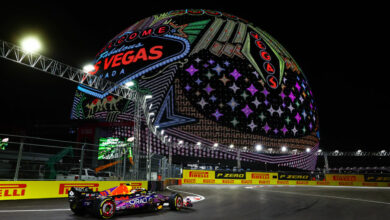Fernando Alonso’s Controversial Radio Messages Amid Japanese GP Drama
Insights into Alonso's Frustration and Tire Strategy at the Japanese Grand Prix
Fernando Alonso, a veteran of the Formula 1 circuit, found himself in the spotlight during the Japanese Grand Prix, not for his on-track prowess, but for his candid radio exchanges with his team at Aston Martin Cognizant Formula One Team. The 42-year-old Spaniard was quite vocal about his frustrations, particularly regarding the perceived lack of straight-line speed in his AMR23 F1 car. However, Alonso believes his messages were taken somewhat out of context, adding a layer of controversy to the race.
Throughout the race, Alonso’s frustration became increasingly evident, especially when it came to the team’s aerodynamic setup choices for the Japanese GP. However, fortune seemed to favor the determined driver when a first-lap incident involving Sergio Perez and Lewis Hamilton provided an opportunity to advance to sixth place.
Despite the promising start, Alonso’s race took a puzzling turn when the team decided to pit him on lap 11. It was at this moment that Alonso, grappling with the perceived lack of straight-line speed in his AMR23, vented his frustration over the radio, exclaiming, “throwing me to the lions stopping that early.” This statement, though emotive, was not a reflection of anger, as clarified by Alonso himself when questioned by the media.
“Well, not angry.
“I think it’s the same classic theme, the classic FOM radio, completely out of context.
“I’m not sure exactly what other drivers say when they are behind a car that is slower and on the straight, they are pulling away even when you open the DRS.
“Maybe they say, ‘I’m okay, I’m happy to stay here and to stay behind’.
“But I prefer to be motivated, to overtake them. On track, as I said, I was slower even with the DRS open.
“So I called for a different strategy, we stopped, we beat them. So that’s the way we do it. We beat everyone on track, even if the radio is the highlight.”
In response to the incident, Alonso emphasized that his radio comment about being “thrown to the lions” was a reference to the team’s decision to pit early after just 11 laps. Paradoxically, this decision turned out to be a strategic advantage for the team, ultimately benefiting their race.
When asked whether he questioned the team’s tire choice, Alonso’s response was both insightful and diplomatic. He sought to quell any misinterpretations, asserting that questioning such decisions was part of a driver’s routine in high-stress races. He acknowledged the complexities of tire strategy and indicated that it was all in the pursuit of optimizing performance on the track.
“I think we were fast today, faster than what we thought, in terms of pace,” he said. “I was behind the Ferraris, in front of [Lewis] Hamilton with not too much pressure. I think in lap 12 we stopped. And I think it was to cover [Yuki] Tsunoda, which was a bit of a surprise there.
“After that stop, obviously, the race is very long from that moment onwards.”Maybe that was a mistake. But easy to say now. I think arguably the final result would be P8, after the top teams. So it didn’t change much in our race.”I was upset because the first stop I think it was too early. I didn’t argue. I knew that we stopped too early. And it’s not a problem. Sometimes we benefit.”
In conclusion, the Japanese Grand Prix witnessed a candid exchange between Fernando Alonso and his Aston Martin Cognizant Formula One Team, revealing the intricate dynamics that unfold within a Formula 1 race. While Alonso’s frustration was palpable, his intentions were not to vent anger but to address concerns about the team’s strategy. This incident sheds light on the intense pressure that Formula 1 drivers face and the fine line between expressing frustration and constructive criticism.
“Sure. I think we had two hard tyres, and the Ferraris they had only one.
“We tried to anticipate the first stint, the first stop, you have to force them as well to go early. So I understand the strategy. So there is nothing wrong with it.
“But when you have a very slow car on the straights and you are into traffic, it can be that there are moments of rage that you lose momentum. It happened today, but I’m perfectly fine.”


